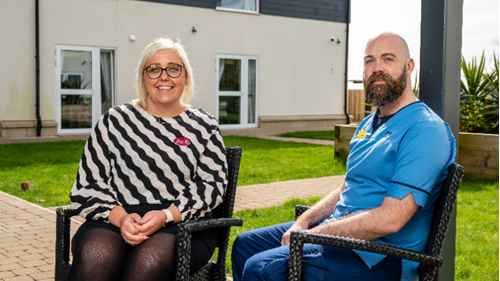Promoting care home practice placements to student nurses

Promoting care home practice placements to student nurses
Practice based learning within the workplace is a key part of student nurse training with 2,300 hours of clinical practice required to meet the 1NMC requirements for registration. Care homes can be a great place to learn, and to work. That’s why this year in the face of real challenges due to the pandemic, NES and Scottish Care have worked in collaboration with care home partners and education institutes to promote care homes as a valuable practice learning experience (PLE).
The Scottish Government commissioned report on the Provision of Nursing, Midwifery and Allied Health Professions (NMAHP) placements in the 2020-21 Academic Session (NES 2020) (PDF) highlighted the significant potential the care home sector had to provide increased placement capacity. In July 2021, only 303 of Scotland’s 1,084 care homes for adults were approved practice learning environments for students.
The care home sector continued to face challenges with staff recruitment and retention. This in turn had an impact on practice supervisor and assessor capacity, roles that were essential to supporting student nurse placements. Despite this 2021 saw the beginning of a gradual increase in student placements. NES Care Home Education Facilitators (CHEFs) played an active and important role engaging with care homes and providing training and support to make this happen.
The ambition
Scottish Care represents the largest group of independent sector social care providers delivering residential care, nursing care, day care, care at home and housing support services.
NES and Scottish Care recognised that more intensive partnership working was key to achieving their goals2.
- to increase the scope and volume of practice learning placements across care homes
- to promote the benefits of becoming a practice learning environment to care home managers
- to promote to student nurses the valuable practice learning experience offered there
During 2021, NES and Scottish care laid the foundations for how they would realise their goals, including these partnership initiatives:
- June: NES contributing to a Scottish Care event looking at the future vision for health and social care nursing including supporting clinical practice, improvement, and the importance of the new NMC standards in proficiency, education, and training. (114 attendees including job roles Directors of care homes, care home Managers, independent sector leads and student nurses)
- July: NES presenting ‘Supporting student placements’ as part of Scottish Care’s webinar for care homes, which featured three CHEFs talking about different aspects of their roles.
- Autumn: NES contributing an article looking at ‘Our future workforce - supporting student placements in care homes’ to Scottish Care’s Bulletin publication.
Care homes as practice learning environments
Jane Douglas, Transforming Nursing Workforce Lead, Scottish Care, said:
"A care home practice learning experience is a great opportunity for pre-registration students to learn and craft their nursing skills. We needed to showcase care homes differently - focusing on what they could offer both as a placement and career option. We needed to nurture that - how we talk about care homes and how we promote them within universities. Then, when students qualify, they might opt to work there because of their positive experience.
"We also need to promote the career pathway for care home nurses. People need care and support from nurses - their oversight, direction, and supervision. That’s why it's so important the care home is seen as a positive environment."
Karlynn Wheelan, Manager of Kingsacre Care Home in Clydebank and a qualified nurse, agreed:
"It is essential students have a wide variety of placements and different experiences during training. It is important to me to support students in a practice learning environment and work together to break the stigma attached to care home nursing.
"Kingsacre became a practice learning environment in the past nine months, and we have supported four students at various stages in their training. They all expressed surprise at how much they loved their placements.
"I've built excellent relationships with several members of the NES CHEF team during my 12-year career in the care home sector. I’m happy to support students because I know I'll be well supported by the CHEFs."

Pictured above: Karlynn Wheelan, Care Home Manager and Allan Dickins, CHEF
Allan Dickins, CHEF, NHS Greater Glasgow & Clyde added:
"Having students on placement is so valuable for care home staff, managers and residents. They ask questions and encourage supervisors and assessors to reflect on their own practice. I often receive enquiries from contacts asking about new research or topics because a student was talking about it."
Karlynn Wheelan agreed:
"As you support more students, you identify more learning opportunities. Students come from a variety of backgrounds, experiences and placements and are each looking for different outcomes.
"They bring new ideas, learning and newer ways of working with them. Residents love the presence of younger people. They bring extra buzz to the home. CHEF teams also direct us to NES and Scottish Care resources for training and CPD. All this results in good staff development and ultimately, better outcomes for residents.
"The presence of students in the home allows us to start breaking that stigma and supports recruitment. For example, one of our placement students has joined our staff bank. And by the end of 2022, we hope all seven care homes in our group will take students on practice placements."
The Care Home Education Facilitator (CHEF) role
Jane Douglas acknowledged the importance of the CHEF in reaching out to care homes, promoting the value of students, and helping managers become a practice learning environment.
Allan Dickins explained:
"CHEFs maintained engagement with and support to care homes during COVID even in the absence of student placements. They were the only members of my team allowed to visit clinical areas. When that was not possible, we hosted Zoom workshops and virtual drop-in sessions.
"Where care homes still had students on placement, I continued my two-weekly emails and phone calls to offer guidance. However, I could not visit because staff were so busy. Those care home colleagues I have worked with for years, would not hesitate to call if there were issues, difficulties or questions I could help with.
"With new care home contacts, I talk about the Nursing and Midwifery Council (NMC) standards for supervision and explore learning opportunities available. I ask for volunteers interested in becoming practice supervisors or practice assessors. These are the roles the NMC has designated for formally supporting students within a practice learning environment.
"I then support the manager to populate a Quality Management of the Practice Learning Environment (QMPLE) website. This demonstrates to students and university staff the learning opportunities available and other quality management systems that are in place.
"That leads on to a meeting involving university staff, the care home contacts and me to undertake an educational audit. This gives all parties the opportunity to highlight the benefits of student placements: to residents, to people's learning, and to students, namely what they can learn from care home staff and residents."
Jane Douglas expanded on the learning and practice opportunities:
"Care homes can be busy and acute, but you have time to get to know people who live there, and you are learning to practice in a homely setting.
"You are working holistically, looking at person-centred models of care. You undertake risk assessments and develop care plans around how people want their care delivered. You are looking at the networks that support them including their families and understanding how important it is to use all your skills.
"When supporting a person to wash, you are assisting them in a dignified way, promoting choice, dignity, rights. You are providing care and support in the least intrusive manner but doing it compassionately. While you are with that person, you are assessing them. You are doing that not just by asking the person, but through observation of their skin, their eyes, their mouth. Are they drinking? Are they hydrated? Are they moving about? Are they cognitively aware?
"You are doing all these things while having a conversation with the person about how they are feeling and their life. Rather than seeing nursing as a series of tasks it’s about understanding that holistic model of care.
"Good care should be unobtrusive. A good carer or nurse will be able to slot in and support in a person-centred way. They will promote independence and enable the person to be as competent as they can. It's about learning that, because that is a real art of nursing, and nursing is an art and a science. But that is the art of providing good care.
"If you do that properly, that person will feel comfortable with you and it will be a seamless model of care and a support of care. And that comes with that art of practice. I firmly believe that is what we can help our students learn in care homes."
Jane Douglas added:
"Donna Craig at NES has been instrumental in helping me develop a model that supports our care home managers.
"This year we’re using social media, creating films and stories about the student and care home experience. A good experience is important for all – students, care homes and ultimately, the person receiving care or needing support. Students bring that voice – asking questions, seeing what works well and will share that.
"We need people on board, to take students and for them to have that valuable experience. It’s necessary if we are to recruit nurses into the sector."
Looking back on 2021 Donna Craig, Senior Educator – Practice Education & Pre-registration - Recovery and Capacity, NES, said:
"We continue to explore and innovate new approaches to facilitate practice learning experiences for students with our care home partners.
"The care home sector has faced significant challenges with recruitment and retention of staff which has impacted their practice supervisor and assessor capacity. Our CHEFs have continued to provide support to maintain the number of approved practice learning environments and 1300 (circa) students had a PLE in a care home during 2021.
"NES and Scottish Care have more activities planned for 2022. A virtual event celebrating nursing in social care takes place on 12 May. The afternoon session will highlight the value of care homes as a practice learning environment."
1Students on undergraduate programmes in adult nursing approved by the Nursing and Midwifery Council (NMC) must complete 2,300 hours of clinical practice while training. Higher Education Institutes, their practice learning partners and NES national network of Practice Education Facilitators (PEF) and Care Home Education Facilitators (CHEF) work in partnership to support developing quality practice learning experiences for pre-registration nursing students. Placement providers can be private, voluntary or NHS organisations.
2Scottish Government funding for a two-year expansion of the NES practice education network included the outcome: engagement activities to support the development of sustainable placements and extend the breadth of practice learning experiences (PLE) to contemporary health and care environments.
How could we help you? We'd love to hear from you. Please get in touch.
This case study is of part of our Year in Review 2021.
May, 17 2022
